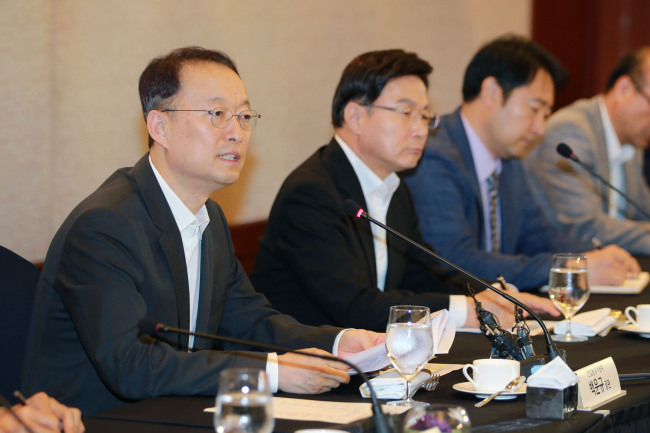South Korea to invest W2.6tr in fuel cell vehicles
By Kim Bo-gyungPublished : June 25, 2018 - 15:42
The South Korean government and businesses agreed to invest some 2.6 trillion won ($2.33 billion) over the next five years to speed up the country’s hydrogen gas-powered vehicle industrial ecosystem, the Trade Ministry said Monday.
Aiming to gain an upper hand in the prospective global fuel cell vehicle market, the 2.6 trillion won will be spent on building plants for fuel cell vehicles and fuel cell stacks, manufacturing fuel cell buses and developing fuel cell storage containers.
In doing so, the industry would reportedly be able to supply 16,000 units of fuel cell cars and install 310 hydrogen stations nationwide by 2022.

“Through the end of the year, the government will innovate related regulations and laws, while carrying out pilot projects for citizens to get firsthand experience of hydrogen-powered vehicles,” said Minister of Trade, Industry and Energy Paik Un-gyu at a meeting with fuel cell industry officials in Seoul.
He added there has been low national acceptance for fuel cell vehicles along with a lack of chargers and the right environment nationwide to foster sales.
The meeting was attended by Hyundai Motor Group Vice Chairman Kwon Moon-sik and SK Gas President Lee Jae-hoon, among others. Last week, Hyundai Motor signed a deal with German luxury carmaker Audi to collaborate in fuel cell electric vehicle development, seeking to rival strategic alliances between Toyota and BMW as well as between Honda and General Motors.
According to global management consulting firm McKinsey & Co., the fuel cell industry will generate $2.5 trillion in added value annually, creating over 30 million jobs worldwide by 2050.
Part of the 2.6 trillion won in funds would go to setting up factory lines exclusively for fuel cell buses, as Hyundai Motor currently produces its fuel cell buses at its factory in Jeonju, North Jeolla Province, where combustion engine-powered buses are made, the ministry said.
Hyundai Motor was the first carmaker to mass produce a FCEV, dubbed “Tucson ix,” in 2013. It is one of three firms, along with Toyota and Honda, with the technology and capacity to produce hydrogen-powered vehicles.
Last year Hyundai rolled out the Nexo FCEV with the longest driving distance of 609 kilometers, chargeable in five minutes.
South Korea, however, has lagged behind competitors in terms of infrastructure to back up sales and further development of the lucrative vehicle.
There are a total 16 hydrogen stations nationwide, out of which nine are used for research, while Japan had 101 charging stations as of last March and plans to have 320 by 2025.
About 125 billion won will be used for research and development of key auto parts in fuel cell vehicles, including localizing production of fuel cell stacks.
Fuel cell stacks are an essential component that creates electricity by combining oxygen and hydrogen, acting as the engine for internal combustion engine vehicles.
The stacks are currently produced by Hyundai Group’s auto parts maker Hyundai Mobis.
In cooperation with five regional governments, including Seoul and Ulsan, the fuel cell buses will operate intracity bus routes by next year, ultimately supplying 1,000 units by 2022, the ministry said.
In securing stable supply and distribution channels, the government plans to lower the cost of hydrogen energy below diesel and liquefied petroleum gas, approximately to 70 won per kilometer for hydrogen. By Kim Bo-gyung (lisakim425@heraldcorp.com)











![[Today’s K-pop] BTS pop-up event to come to Seoul](http://res.heraldm.com/phpwas/restmb_idxmake.php?idx=644&simg=/content/image/2024/04/17/20240417050734_0.jpg&u=)
![[Graphic News] More Koreans say they plan long-distance trips this year](http://res.heraldm.com/phpwas/restmb_idxmake.php?idx=644&simg=/content/image/2024/04/17/20240417050828_0.gif&u=)




![[KH Explains] Hyundai's full hybrid edge to pay off amid slow transition to pure EVs](http://res.heraldm.com/phpwas/restmb_idxmake.php?idx=652&simg=/content/image/2024/04/18/20240418050645_0.jpg&u=20240419100350)

